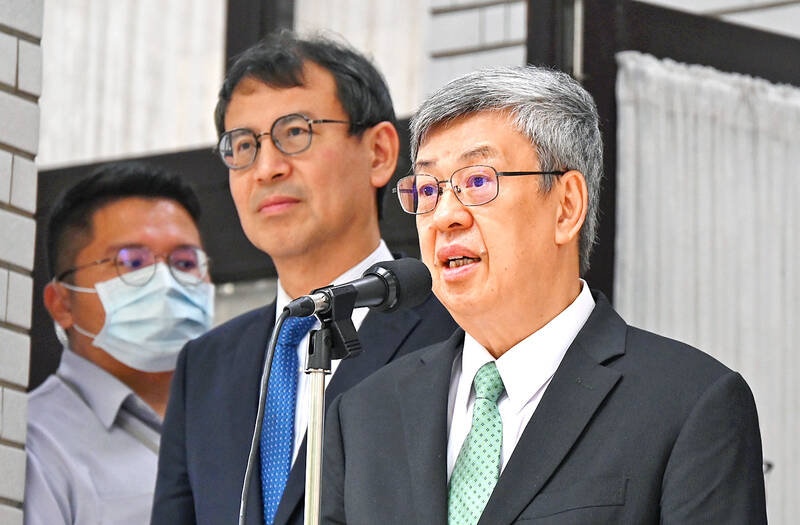Beijing’s passage of legislation to promote patriotism, and including Taiwanese in the law, is an exercise in futility and runs counter to common sense, Premier Chen Chien-jen (陳建仁) said yesterday.
China’s national legislature on Tuesday passed the Patriotic Education Law to strengthen patriotism among children and families so as to counter challenges such as “historical nihilism” and to safeguard “national unity,” state media reported.
The legislation provides a legal guarantee for carrying out patriotic education, Xinhua news agency said, adding that it would take effect on Jan. 1 next year.

Photo: Liu Hsin-de, Taipei Times
“Historical nihilism” is a term Beijing uses to describe views that are critical of the Chinese Communist Party’s version of historical events.
The legislation states that it applies to mainland China, Hong Kong, Macau and Taiwan.
Speaking from the sidelines of a legislative session, Chen said that it is common sense that the rights and duties of Taiwanese can only be defined by laws and regulations passed by the Taiwanese legislature through democratic due process.
“A state that demands patriotism from its people has to earn that love by governing well and being worthy of public trust,” he said.
“Trying to legislate patriotism is like ‘climbing a tree to catch fish (緣木求魚),” he added, using a Chinese idiom describing a futile act.
Mainland Affairs Council Deputy Minister Jan Jyh-horng (詹志宏) said the council is assessing the potential impact of the law on the safety of Taiwanese in China, although the legislation does not stipulate any penalties for noncompliance.
“The experience of countries around the world, especially democratic ones, shows that patriotism can only flow naturally from the heart of the people and cannot be compelled,” he said.
“Compulsory patriotism has a checkered history of success,” he added.
“If China is bent on promoting [patriotism], we would advise it to focus on encouraging Chinese to voluntarily care about their nation,” he said.
Beijing’s passage of a flurry of laws on national security, espionage and patriotic education is a concentrated attack on freedom of speech, said Yeh Yao-yuan (葉耀元), associate professor of international relations at the University of St Thomas.
The vagueness of the legal language in these pieces of legislation is a built-in feature to empower the authorities to more effectively suppress personal freedoms, he said.
The Patriotic Education Law is the latest push in China’s efforts to strengthen state control over speech and provide a basis for imposing penalties and consequences for defiance, said Chen Kuide (陳奎德), executive director of the US-based nonprofit Princeton China Initiative.
Additional reporting by Reuters and CNA

AT RISK: The council reiterated that people should seriously consider the necessity of visiting China, after Beijing passed 22 guidelines to punish ‘die-hard’ separatists The Mainland Affairs Council (MAC) has since Jan. 1 last year received 65 petitions regarding Taiwanese who were interrogated or detained in China, MAC Minister Chiu Chui-cheng (邱垂正) said yesterday. Fifty-two either went missing or had their personal freedoms restricted, with some put in criminal detention, while 13 were interrogated and temporarily detained, he said in a radio interview. On June 21 last year, China announced 22 guidelines to punish “die-hard Taiwanese independence separatists,” allowing Chinese courts to try people in absentia. The guidelines are uncivilized and inhumane, allowing Beijing to seize assets and issue the death penalty, with no regard for potential

STILL COMMITTED: The US opposes any forced change to the ‘status quo’ in the Strait, but also does not seek conflict, US Secretary of State Marco Rubio said US President Donald Trump’s administration released US$5.3 billion in previously frozen foreign aid, including US$870 million in security exemptions for programs in Taiwan, a list of exemptions reviewed by Reuters showed. Trump ordered a 90-day pause on foreign aid shortly after taking office on Jan. 20, halting funding for everything from programs that fight starvation and deadly diseases to providing shelters for millions of displaced people across the globe. US Secretary of State Marco Rubio, who has said that all foreign assistance must align with Trump’s “America First” priorities, issued waivers late last month on military aid to Israel and Egypt, the

‘UNITED FRONT’ FRONTS: Barring contact with Huaqiao and Jinan universities is needed to stop China targeting Taiwanese students, the education minister said Taiwan has blacklisted two Chinese universities from conducting academic exchange programs in the nation after reports that the institutes are arms of Beijing’s United Front Work Department, Minister of Education Cheng Ying-yao (鄭英耀) said in an exclusive interview with the Chinese-language Liberty Times (the Taipei Times’ sister paper) published yesterday. China’s Huaqiao University in Xiamen and Quanzhou, as well as Jinan University in Guangzhou, which have 600 and 1,500 Taiwanese on their rolls respectively, are under direct control of the Chinese government’s political warfare branch, Cheng said, citing reports by national security officials. A comprehensive ban on Taiwanese institutions collaborating or

France’s nuclear-powered aircraft carrier and accompanying warships were in the Philippines yesterday after holding combat drills with Philippine forces in the disputed South China Sea in a show of firepower that would likely antagonize China. The Charles de Gaulle on Friday docked at Subic Bay, a former US naval base northwest of Manila, for a break after more than two months of deployment in the Indo-Pacific region. The French carrier engaged with security allies for contingency readiness and to promote regional security, including with Philippine forces, navy ships and fighter jets. They held anti-submarine warfare drills and aerial combat training on Friday in